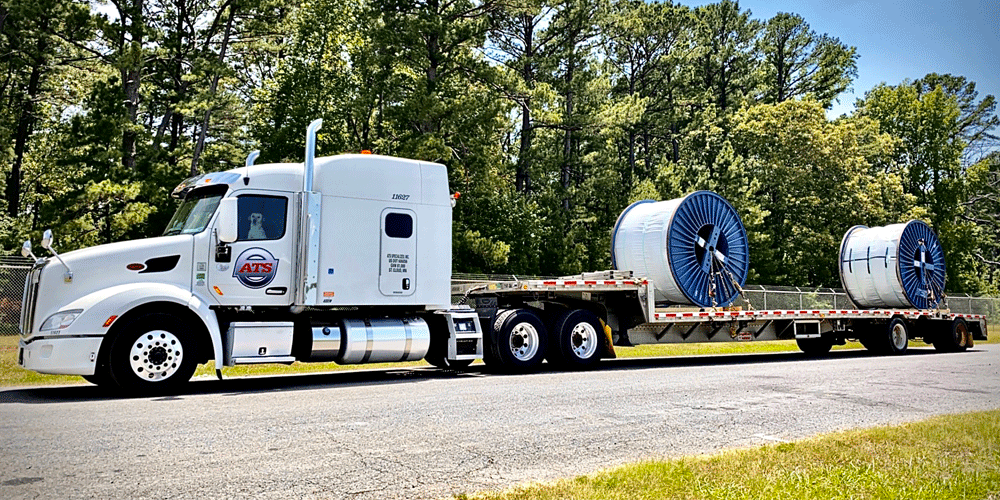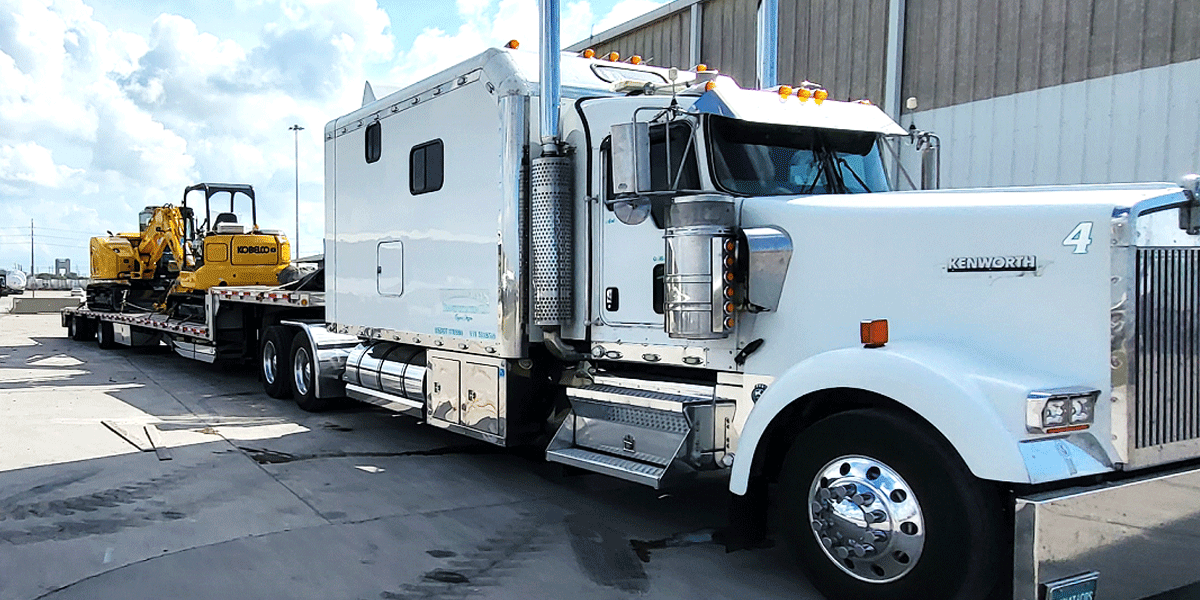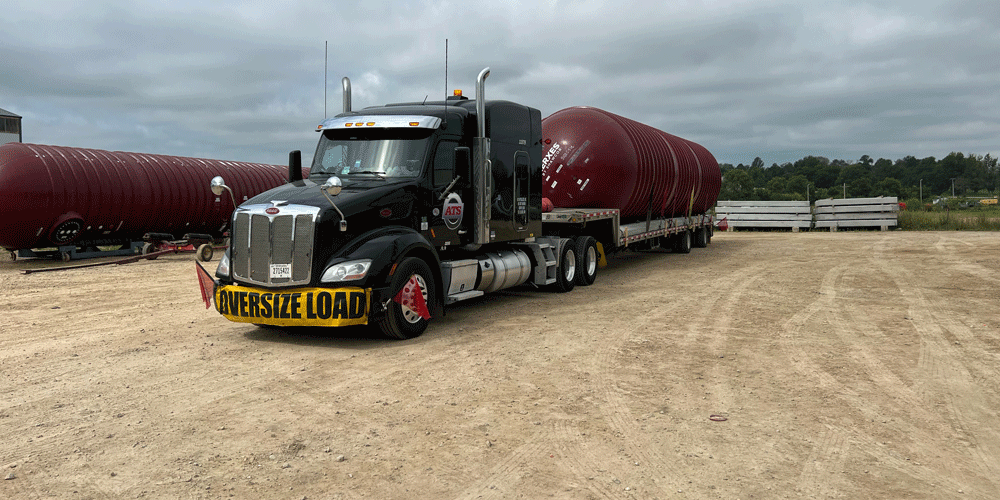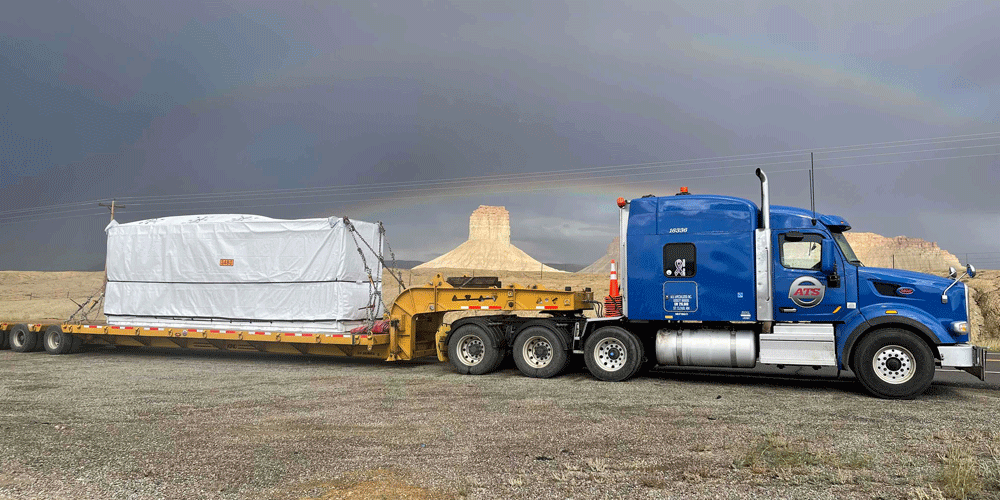Is OTR Truck Driving Worth it During the Trucking Downturn?
Jodi has been with ATS as a specialized driver manager since 2018. She manages a fleet of 40 drivers. She loves that she gets a chance to be part of the execution process. There’s never a dull moment in her very challenging but very rewarding position.
It’s a tough time to be a truck driver right now.
But then again, being a truck driver was never an easy job to begin with. The job is demanding both physically and mentally. It takes you away from your family and the place you call home. But it also puts food on the table for the people that you love, it allows you to provide for them and, in turn, you have a stable, noble job that keeps our world running.
Truck drivers like you are essential, but right now, with the current down market, it can feel tough to keep up with the lifestyle.
So how do you decide if over-the-road (OTR) trucking is worth it for you? What are the questions you ask yourself in the moment when you’re frustrated about your job and want to quit? How do you get up and start driving again each morning?
Those questions you ask yourself — and, moreover, the answers they lead to — will lead to make it or break it decisions.
As a driver manager at Anderson Trucking Service (ATS), I’m here to help you take a step back, pause and carefully consider your decision — and, ultimately, your business plan. ATS has been around for more than 70 years and we’ve seen just how volatile the market can be; we’ve helped drivers overcome extreme hardships and still excel in the industry.
In this article, I’ll discuss:
- Questions you should ask yourself when deciding if OTR is still right for you
- How to run efficiently in a down market
- How to decide if the lifestyle is worth it for you
When you’re finished reading, you’ll know exactly what your next step should be.
Questions to Consider Before Quitting Your OTR Job
Let’s rewind a little bit and go back to the beginning. Why are there countless drivers who want to quit the trucking industry right now? What’s going on with the market?
Partway through 2022, spot market prices dropped significantly. On top of that, freight availability and demand have dropped.
How does that impact drivers? For starters, some drivers might be struggling to make the same amount of money they were making a year ago for the same amount of work. Keep in mind that drivers are still making more money than they were before the pandemic hit, but many got used to such large checks as the great market lasted so long.
But now, drivers might be deadheading more and they might experience difficulty finding what they consider good loads. All of this has made a difficult industry even more difficult for drivers.
These extenuating circumstances have made a lot of drivers reconsider if OTR — or truck driving itself — is still the right path for them. And sometimes, you might feel so frustrated that you want to quit on the spot.
While leaving the trucking industry might be the right move for you, I highly encourage you to consider all sides of the situation and what your immediate next step will be.
Before you call your driver manager and quit in frustration, ask yourself these questions to make sure you’re making the right decision for yourself.
Question #1: How Much Were You Earning Last Week? Last Month? Last Year?
There are a lot of drivers feeling upset about increased deadhead miles and cheap freight.
Before you decide to quit on the spot, look at how much you’re currently making and compare it to the previous year. Are you making significantly less or are your averages similar?
If you are making less, are you still making enough money to support your needs and wants? The entire transportation industry is feeling this struggle. You may not be making as much as you’re accustomed to making, but if you can make enough money to get by and support yourself and your family, reconsider keeping your job for stability’s sake.
If you run your business a little differently to accommodate the down market, you should be able to take home a salary that is similar to what you averaged last year. It may be a matter of simply changing your strategy on the road versus quitting altogether.
Question #2: Can You Get Another Job?
Before you quit your OTR trucking job on a whim, consider if you have another job to go to. If you have no immediate income coming in from driving, where will you get the funds you need to support yourself?
You should also understand that every trucking company is experiencing these issues with freight rates dropping. If you decide to jump to another carrier, you’ll be dealing with the exact same issues. It’s simply a product of the current market we’re living in.
You might be considering taking a regional position instead of continuing on with your OTR position. Before you make that move, which is certainly an enticing one for drivers who want to be home more often, understand that the market is affecting regional positions as well.
If you decide to leave the trucking industry altogether, think twice about how easy it will be to get a job, when you’ll be able to start and if that job will pay you as much as you make on the road. Do you have prospects? Will you be able to quickly start in another industry?
Make sure you have a plan for how you’ll earn an income — or at least have savings built up to cover a few months of expenses — before you quit.
Question #3: Can You Make As Much Money Working Another Job?
A lot of drivers are leaving their OTR positions because of money. Specifically, they want more of it and they’re sick of working so hard for what they feel are meager earnings.
Let’s consider a scenario in which you have no problem getting another job immediately after quitting your OTR trucking job. Can you make a living at another job? Is the money similar to how much money you’re currently making truck driving?
The current minimum wage is $15 and under depending on the state you live in. You can probably easily take a job working in fast food that pays $15 per hour, but is that something you want to do and something that’ll support your family?
Let’s say you take a job for $15 an hour. If you work 40-hour weeks (full-time), you’ll earn $31,200 annually (before taxes). Truck drivers earn well over that amount.
That means, if you decide to quit, you either need to be okay with taking home less money than you’re used to making trucking or you need to find a job that pays you just as much as you’re making now. It may be difficult to find jobs that pay above minimum wage or you may be required to work your way up the ladder to make a decent living.
Question #4: Are There Other Ways You Can Succeed as an OTR Driver?
It’s easy to think the grass is greener on the other side when you’re upset, but consider if there are other strategies you can implement in your daily work to increase your pay and quell some of your frustration.
Can you change your running style? Could you get up earlier in the day and maximize your Hours of Service (HOS)? Could you cut costs in certain areas and put more money in your pocket?
Some lease drivers may also consider the switch to company driving, which can provide more stable freight rates in a down market. As a company driver, you’ll earn the same rate you signed on with, no matter how much freight rates fluctuate. If you’re ready to sell your truck and let go of the responsibility as an owner-operator or your lease is up, see if you can switch to company driving by talking to your driver manager.
Question #5: Is it the Job, or Is it the Current Circumstance?
Sometimes truck driving just might not be the right move for you. Maybe you’re upset about your current situation, but you’ve been upset about your current situation for a long time.
Many drivers leave the trucking industry because there’s a situation at home that requires them to be home more often. Or maybe they’ve just decided they’ve had enough of the industry. Carefully consider if you’re upset about the current market, if you’re just ready for a change in general or if you’re needed at home.
How to Succeed as an OTR Driver in a Down Market
If you’ve thought about these questions and have decided you’re not ready to quit being an OTR driver yet, the strategies below, when implemented, will help you run more effectively and bring in a salary you’re more comfortable with.
Tip #1: Know Your Costs and Set a Budget
If you’re an independent contractor and you don’t already know what your operating costs are, you need to take the time to figure it out. To calculate your cost per mile, you need to know what your weekly fixed and variable costs are. This article will teach you how to calculate your cost per mile.
Once you know how much it costs to run per mile, you’ll know exactly how much money you need to average per mile to break even. Every mile that pays above your cost per mile is pure profit to your business.
Your driver manager can also help you calculate your cost per mile if you need additional assistance.
As a company driver, you’ll have expenses on the road too, even if the carrier you drive for is covering your fuel costs and truck payments. Now is the time to take stock of your expenses on the road and set a budget. How much money do you spend at truck stops on showers, laundry and food? What other expenses do you have?
Tip #2: Talk to Seasoned Drivers
This market may be volatile, but it’s not the worst we’ve ever seen. Some seasoned drivers have been in the industry for 20-plus years and have seen far worse; they’ve excelled in the industry to tell the tale.
Seek them out and ask them for advice. Talk to your company to see if they can refer any drivers to you or seek out seasoned drivers at the truck stop.
Sometimes it's nice to hear from a seasoned driver that’s experienced a down market rather than just trusting what your driver manager says.
Tip #3: Plan Your Home Time
It’s important to plan your home time and budget for it. Try not to go home on a whim. If you do, and you don’t have the money to cover your operating costs for the time you’re at home, you can end up in arrears.
If you know that you can get home with your company every two weeks, then your strategy should be to run hard and maximize your potential while you’re on the road for those two weeks. Utilize your clock, run recap hours and don’t do a reset every weekend.
Tip #4: Don’t Be Too Choosy With Freight
In a down market, you have to change your strategy. With high freight availability and spot markets on the rise during the pandemic, drivers could essentially name their rate. They could run fewer miles and still make incredible money.
That’s no longer the case. If you want to keep making the same money you were making at the height of the pandemic, you have to run differently. You may need to run more miles and be less choosy about your loads.
At one point, maybe you refused to run in a specific area or you refused to haul a certain type of load. Because freight isn’t as readily available as it used to be, you’ll want to be open-minded and keep your opportunities open to run more miles.
Of course, you still need to follow your HOS regulations, so you have to run more efficiently and maximize your time.
The best way you can do that is by trip planning, keeping your wheels moving and keeping a close watch on your hours.
Tip #5: Stay in the Freight Lanes You Know Are Paying Well
If you’re an independent contractor and you find a freight lane that’s paying well, that’s providing consistent freight and isn’t requiring you to deadhead much (if at all), try to maintain that lane.
Tip #6: Cut Costs on Food and Fuel
Now is the time to be in savings mode. This is the strategy many individuals are taking with inflation being so high. Minimize expenses where you can; it’ll help you get through this particularly frustrating time. That means saving money on everything from food to fuel consumption.
If you avoid eating every meal at the truck stop or a nearby restaurant, you can save yourself hundreds of dollars each week. Meal prepping also offers the chance to eat healthier.
If you’re a company driver, you don’t have to worry about fuel costs, but if you run as an independent contractor or owner-operator, chances are fuel has been a big concern for you in 2022.
Adopting fuel-efficient practices will help save a lot of money. One thing you can do right now before the temperatures drop is to avoid idling your truck, which burns excess fuel.

The Future of the Trucking Industry
When it comes down to it, we’re working through a tough market right now and we recognize it isn’t easy on you. However, remember, industry-wide, drivers are seeing the same drop in freight rates. Your company isn’t operating in a silo; all drivers are seeing decreased rates at every company.
That’s why it’s important to think twice before you make your decision to rage quit. It might feel satisfying to quit on the spot in the moment, but it might not be the ideal long-term decision for you. Make sure, if you do decide that quitting is the right move for you, you have a sound, well-researched plan in place.
At ATS, we want to make sure you’re happy and satisfied in your current role. We don’t want you to do anything that would harm you or your business. Take a second look at your choices and think twice about your decision.
If you’re considering quitting because of the market, understand it’s bad everywhere. Learn more about what’s expected to happen in quarter four.
Until then, you have to keep rolling with the punches in this industry. Embrace the good times and brace for the bad times.



